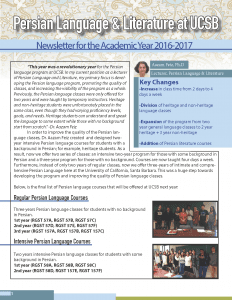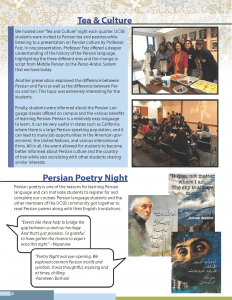The Middle East Studies (MES) Program was established in 1994 following a three-year planning period. The Letters and Science Executive Committee approved the major in May 1995, and it was endorsed by CEPAP in October 1995.
The purpose of MES is twofold: 1) to grant a BA in Middle East Studies; and 2) to help graduate students in the various disciplines to obtain appropriate language and area-studies training as part of their degree programs, and to provide needed graduate financial assistance. In addition, MES provides funding and helps to coordinate lectures, colloquia, and visiting scholars.
With the exception of two lower-division core courses, courses for the BA are drawn from those already offered through various departments in the College of Letters and Science. Twenty faculty members in a diversity of departments — including history, music and political science — serve on the advisory committee.
In 2000, a Center for Middle East Studies was established to administer a federally-funded National Resource Center grant secured by MES faculty for instructional, programmatic and research support. Many of the Programmatic aspects of MES are currently supported by this Center.
The Middle East Studies Major is an interdisciplinary major leading to the Bachelor of Arts degree in which students explore the myriad peoples, societies, languages, and cultures of the Near East and the Islamic worlds. The program brings together two overlapping but quite distinct areas of study: first, the Near East in the Ancient, Islamic, and modern periods; second, the religious and cultural traditions of Islam, both within its original Near Eastern homeland, and in other regions of the world where Islamic traditions have come to play a major role — South and Southeast Asia, Africa, and, (more recently) Europe and North America.
As a key part of their studies Middle East Studies strongly recommends, though does not require, that students spend a substantial period of time abroad in the UC Education Abroad Program centers in Jerusalem or Cairo, or in other suitable programs. Members of the Advisory Committee will work actively with interested students to help them identify appropriate opportunities for study abroad.
The program does not offer the M.A. or Ph.D. However, it can help graduate students to coordinate interdisciplinary study across departmental lines, and it also provides an enrichment of UCSB’s own resources through the lectures, colloquia, and seminars which it sponsors. Likewise, Middle East Studies can offer limited financial assistance, on a competitive basis, to qualified graduate students. Finally, the program also collaborates with the Von Grunebaum Center for Near Eastern Studies at UC Los Angeles in areas of common concern.

















